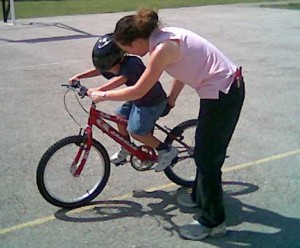
When any of us are getting ready to try something new there is always a bit of nervousness, anxiety or maybe just plain scared. This is true for our children too as they wonder if they will be good at something, will people laugh at me if I mess up, or what if I don’t like it?
Most of us though have had an experience or two that we can look back on and remember having those feelings. It is good to use those experiences with our children so they can see how this is a normal reaction and that you are there to keep them safe. It is also good to use some of their past experiences, like trying a new food or a new activity as an example of being safe.
 With older children I love to use learning to ride a bike as an example. Getting up on the bike without training wheels for the first time is daunting and if, I mean when, we fall off – it can increase the anxiety. But with our reassurance that we are there for them eventually they get it and then bike riding is fun and can become one of our favorite things to do.
With older children I love to use learning to ride a bike as an example. Getting up on the bike without training wheels for the first time is daunting and if, I mean when, we fall off – it can increase the anxiety. But with our reassurance that we are there for them eventually they get it and then bike riding is fun and can become one of our favorite things to do.
Most important for parents is to remember that all children are different and have different needs as they approach new activities. Some may have to watch others performing or learning prior to them trying. Some may need time to think about it, while others may want to jump right in and go for it no matter the risks. There is not a good or bad way of approaching new things, but keeping an open mind to trying new things is important.


